Huge "Police Lives Matter" Facebook page run from Kosovo, pushed misinformation about U.S. cops
This is the online version of the Popular Information newsletter. You can get independent accountability journalism in your inbox every week. Sign up here:
The "Police Lives Matter" Facebook page accumulated over 170,000 fans, with viral content that reached more Facebook users than some of the largest media outlets. The page purported to be run by U.S. police officers, with cops posting about the "first dayshift of my career with a K9" or being "brand new dad." Other posts contained more generic pro-police messaging.
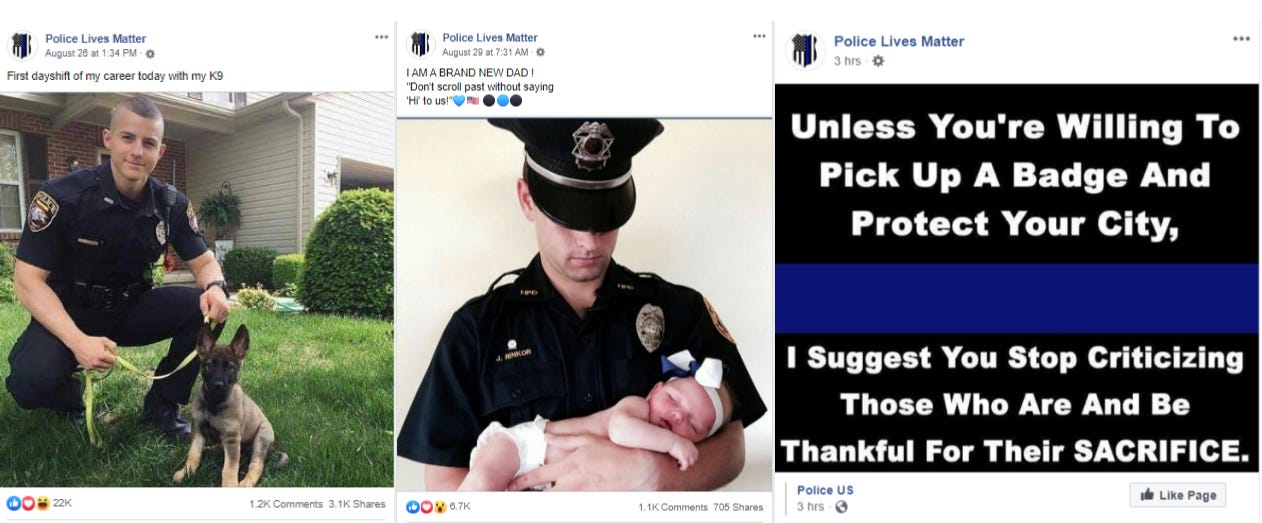
What these posts did not mention is that the page was operated by three people from Kosovo. It was part of a complex network of pro-police pages based out of Kosovo. One such page run by Kosovars, Pro Police Officer, falsely listed a physical address in New York City.
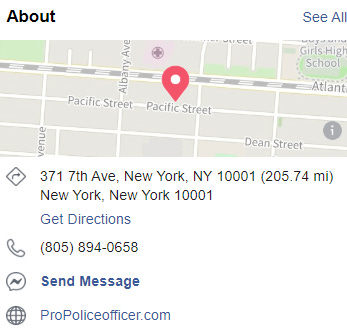
These pages used blatant misinformation to provoke an emotional response from Facebook users. For example, on August 19, 2019, the Police Lives Matter page posted that "a little under three weeks ago" Deputy Farrah Turner had been shot and had just died of gunshot wounds. Turner was actually shot on October 3, 2018, and died on October 24, 2018.
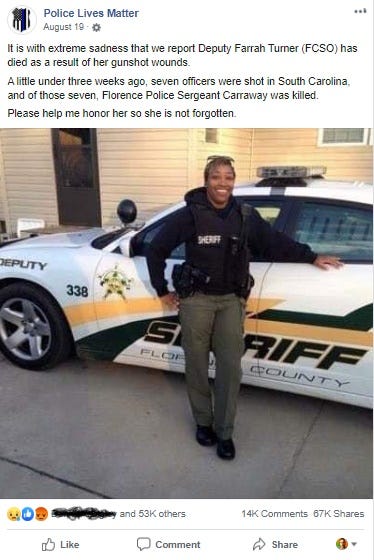
This tactic of misrepresenting and exploiting a police officer's death for shares and likes was used repeatedly throughout the network.
The pages sought to exploit the right-wing backlash against the "Black Lives Matter" movement, which protests the killing of African-Americans by police officers. Pages in the network, all run by managers in Kosovo, included "All Lives Matter," "I Support The Police US not Criminals," and "Blue Lives Matter USA." This right-wing movement has been embraced by Trump, and the Police Lives Matter page included some explicitly pro-Trump messaging.
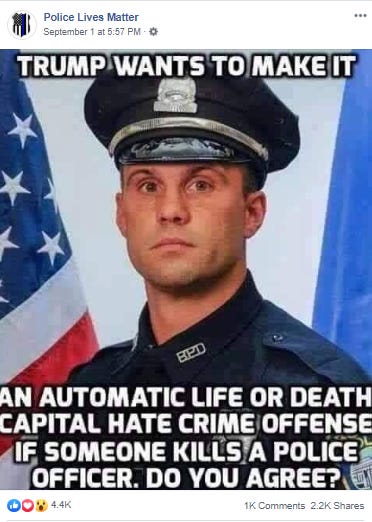
But the motivation behind the page is not promoting Trump, but exploiting the emotions of Americans for profit. Several of the pages contained links to the English language version of Korrespodenti, an Albanian website laden with low-quality programmatic ads.
Ben Nimmo, Director of Investigations at Graphika, told Popular Information that the pages make him concerned "about the information environment" as America approaches another presidential election. "It's clear that the idea that political spam is a good money-maker hasn't gone away since 2016. Pages like this add confusion and polarization to the online debate," Nimmo said.
Popular Information alerted Facebook to the Kosovo-based Facebook network and its practices on the morning of September 27. A few hours later, Facebook took down every page Popular Information flagged.
"We’ve invested in transparency features so that people can flag potentially suspicious activity for us to investigate and take action when we find violations. We’ve removed the Pages that violate our policies and will continue enforcing when we determine misuse," Facebook spokesperson Joe Osborne told Popular Information.
The existence of the Kosovan Facebook network was discovered by Renee DiResta, the technical research manager at the Stanford Internet Observatory, while she was investigating a Ukranian network of pro-Trump Facebook pages at the request of Popular Information. Facebook removed the Ukranian network after the publication of the Popular Information report last week.
The extraordinary reach of "Police Lives Matter"
To bolster the audience of its police pages, the Kosovan network also ran several pages that focused on cute animals, including "Happy Animal Club" and "3-Minute Animal Stories." The power of the network gave the "Police Lives Matter" a reach on Facebook that far exceeded its raw number of followers.
According to Crowdtangle, a social analytics company owned by Facebook, "Police Lives Matter" had as much engagement -- likes, shares, and comments -- over the last 30 days than HuffPost Politics (2.1 million followers), Vox (2.4 million followers), Bloomberg (2.9 million followers) combined. "Police Lives Matter" dwarfed major digitally-native publications like BuzzFeed News (3 million followers) and Quartz (2.4 million followers). More engagement on Facebook corresponds directly to a bigger reach, and more people seeing the content.
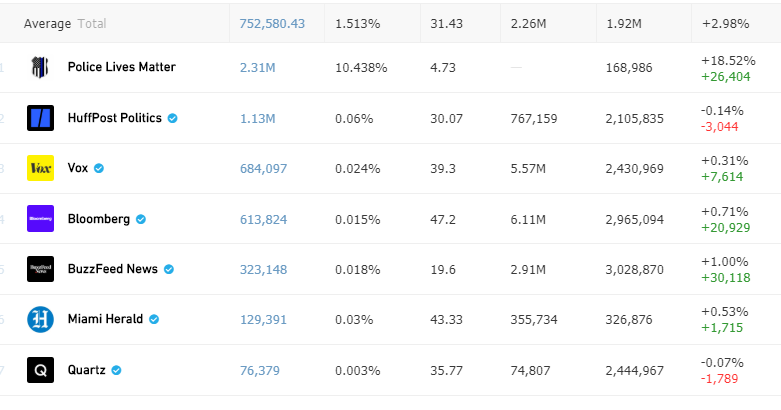
This data only captures the activity on the pages themselves. Several pages in the Kosovan network, including "Police Lives Matter," used closed Facebook groups to amplify their content. This kind of activity is even more difficult to detect because journalists and others do not have access to the content in groups unless approved by a group administrator.
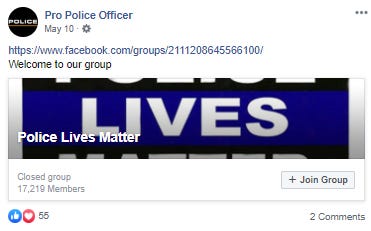
The massive reach of "Police Lives Matter" shows just how easily Facebook's algorithm can be still exploited by unscrupulous actors. This is a tactic that can be used by profiteers or foreign governments seeking to interfere in the 2020 election.
The link between Ukraine and Kosovo
There are some commonalities between the Kosovan Facebook network and the Ukranian network that Popular Information exposed last week. Several pages in the Kosovan network, including "Pro Police Officer" and "All Lives Matter," used memes that were used by "I Love America," the largest page in the Ukranian network.
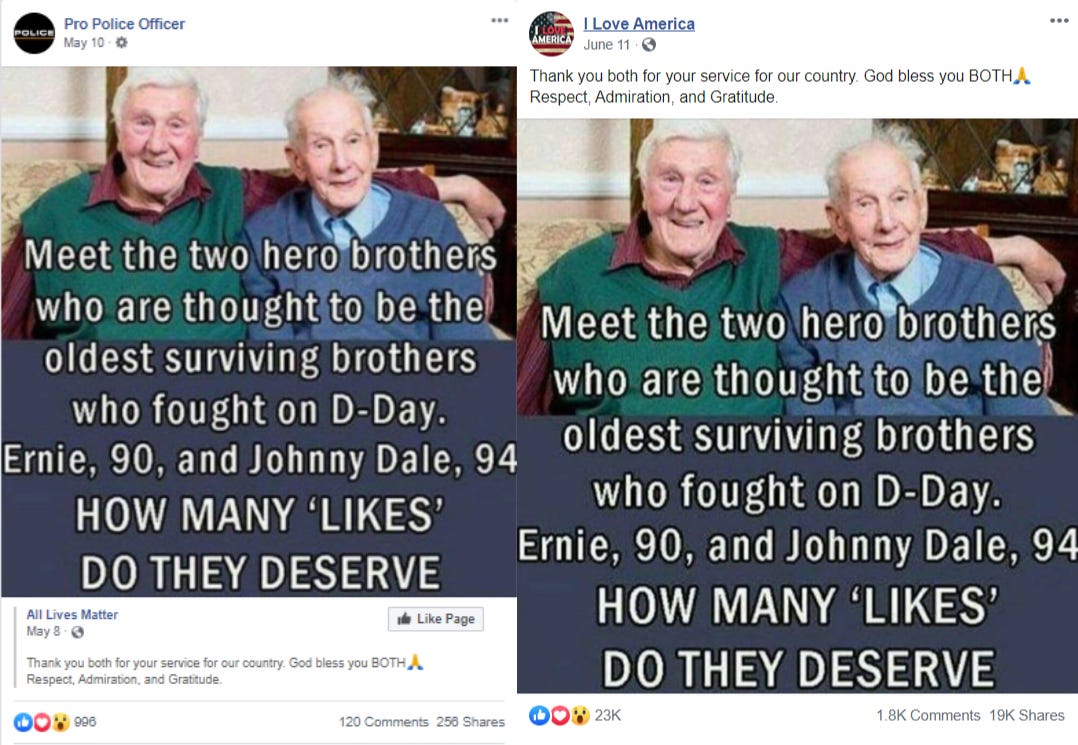
This might be a sign that the people operating these pages are connected. It also could just be indicative of a common technique used to build the pages. In an interview last week, the man behind the Ukranian network, Andriy Tkachenko, explained he was able to run a huge network of pages with just a few people because he developed a system of identifying popular memes from other pages and just reusing them with minimal changes.
Facebook's army
In a speech last week, Facebook’s Vice President of Global Affairs and Communications, Nick Clegg acknowledged the company "made mistakes in 2016" that allowed foreigners " to interfere with the election by spreading division and misinformation." But Clegg said that Facebook had "learned the lessons of 2016" and "spent the three years since building its defenses to stop that happening again."
He did not acknowledge that there are still large Facebook pages, run from abroad, that are pushing misinformation onto unsuspecting American voters.
Remarkably, he claimed that Facebook has 30,000 people working "to take down harmful content." It's unclear what those people are doing.
Clegg also touted Facebook's team of "independent fact-checkers to verify content." But the "independent fact-checkers" include the rabidly right-wing Daily Caller, the website found by Fox News host Tucker Carlson. Popular Information reported that the Daily Caller fact-checked a post from the Facebook page "Rowdy Republican" that contained dangerous misinformation about diabetes and rated it true.
Clegg said the company had "stringent rules on advertising" by politicians. But Popular Information has documented numerous cases where the Trump campaign has run ads on Facebook that are false and misleading, which is prohibited by Facebook rules. For example, the Trump campaign has repeatedly run an ad claiming Democrats are advocating a repeal of the 2nd Amendment. Facebook has not enforced these rules by the Trump campaign.
There are other reasons to be skeptical of Facebook's public statements regarding disinformation on the platform. In April 2018, Facebook CEO Mark Zuckerberg promised "to share huge amounts of posts, links and other user data with researchers around the world so that they could study and flag disinformation on the site." Eighteen months later, "much of the data remains unavailable."
The impeachment inquiry of Donald Trump: Day 6
The conventional wisdom is that Republicans monolithically support Trump. Therefore, any Republican who supports an impeachment inquiry will face a constituent revolt and be thrown out of office in 2020.
But new data suggests that things might be changing. A recent poll by CBS News, conducted September 26-27, found that 55% of Americans favored the impeachment inquiry into Trump -- including 23% of Republicans.
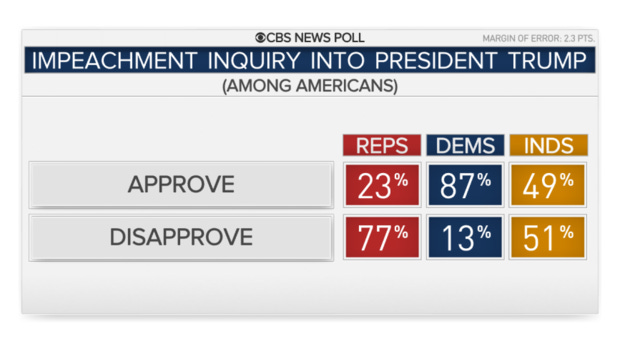
Republican members of Congress are lagging behind their constituents. Just one Republican member of Congress, Mark Amodei (R-NV), publicly supports an impeachment inquiry. That means that while 23% of Republicans support an impeachment inquiry, just 0.5% of Republicans in Congress have the same view.
The poll was taken last Thursday and Friday, before some of the most damaging aspects of the Ukraine scandal were revealed, much less absorbed by the public.
Most, if not all, Congressional Democrats appear ready to impeach and convict the president. The most likely scenario is that Congressional Republicans will continue to rally behind Trump despite his obvious abuse of power. But if more Republican voters begin to support an impeachment inquiry, more Republicans in Congress could jump ship.
Why was Trump so eager to avoid impeachment in the first place? Because in politics, anything can happen.
Thanks for reading!



Me thinks you have found the tip of the Facebook iceberg where unscrupulous foreigners toy with the gullible FB subscribers. Most of whom are older and do vote. The stuff I see in MAGA posts.... Reinforces what you are finding.
This is why I have subscribed from the beginning, Judd. Thank you for finding and exposing these shams. With our government compromised by Trump's corruption, only good journalists like you can take down bad actors.